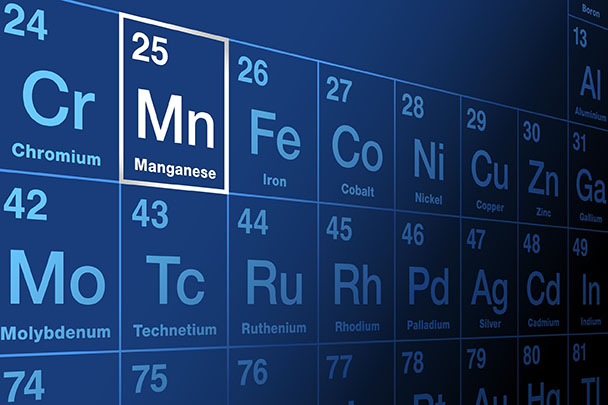

Manganese is a chemical element with the symbol Mn and atomic number 25. It is a silvery-white, hard, brittle metal that is found in rocks and minerals. Manganese is an important mineral for humans and animals. It is needed for many different bodily functions, such as:
The manganese dioxide solution was used to flush the wound.

Noun: A chemical element with the symbol Mn and atomic number 25. It is a grayish-white metal that is the eleventh most abundant element in the Earth's crust.
Adjective: Describing something that contains manganese. For example, you could say "manganese alloy" or "manganese dioxide".
Verb: To treat something with manganese. For example, you could say "The doctor manganesed the patient's leg" or "The farmer manganesed the soil".
The word "manganese" comes from the Latin word "manganesium", which is thought to be derived from the Sanskrit word "manjana", which means "black pigment". This is a reference to the fact that manganese oxide, a black powder, was used as a pigment in ancient times.
The word "manganese" was first used in English in the 17th century. It was originally used to describe the metal manganese, but it soon came to be used in a more general sense to describe anything that contained manganese.
What is manganese?
Question:
Describe the role of manganese in biological systems and its significance in human health.
Answer:
"Manganese" is a trace element that plays a crucial role in various biological processes and is essential for maintaining human health. It serves as a cofactor for several enzymes involved in important biochemical reactions within the body.
One of the key functions of manganese is its participation in the antioxidant defence system. It is an essential component of the enzyme superoxide dismutase (SOD), which helps neutralise harmful free radicals and reactive oxygen species that can damage cells and DNA. This antioxidant activity helps protect cells from oxidative stress and reduces the risk of chronic diseases such as cardiovascular disorders and neurodegenerative conditions.
Manganese is also involved in the metabolism of carbohydrates, amino acids, and cholesterol. It contributes to the synthesis of collagen, a protein essential for wound healing and maintaining healthy skin, bones, and connective tissues. Furthermore, manganese supports proper brain function and development, as it plays a role in neurotransmitter synthesis and neuronal health.
However, excessive manganese intake can have adverse effects on health, particularly affecting the nervous system and leading to a condition known as manganism. Therefore, maintaining a balanced intake of manganese through a varied diet is essential for reaping its benefits without the risks of toxicity.
Address
Developing Experts Limited
Exchange Street Buildings
35-37 Exchange Street
Norwich
NR2 1DP
UK
Phone
01603 273515
Email
hello@developingexperts.com
Copyright 2025 Developing Experts, All rights reserved.